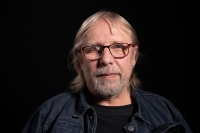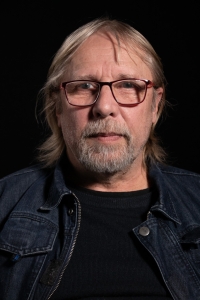The truth stands naked in the street

Download image
Otakar Veverka was born on 27 August 1956 in Gottwaldov (now Zlín). He was a bookworm since childhood. He found his way to poetry, from which it was only a step to his first musical experiments with the guitar. He found his roots in folk music, which became a powerful weapon in the fight against communist totalitarianism. In 1976, he started the compulsory military service in Janovice nad Úhlavou, from where he defected and was sentenced to six months imprisonment, which was extended to a full year after the prosecutor appealed. After his release from prison in early 1978, he moved from Gottwaldov to Prague for work and became acquainted with the dissidents around Charter 77. At that time, he also began performing his songs on smaller and larger Prague stages. The persecution by the State Security (StB) intensified to such an extent that he spent a total of more than 30 days in a pre-trial detention cell during the three months from May to August 1980. Due to his insufficent earnings at the time, he was then sentenced to eight months imprisonment and a three-year ban from Prague for neglecting his maintenance obligations. After his release, he became close to the underground in his hometown and helped to found the Society of Friends of the USA (SPUSA). In 1984, at the request of the chairwoman of the Czechoslovak Socialist Youth Union (SSM) in Gottwaldov, he performed at the Sokolov Political Song Festival, where his anti-regime lyrics caused a huge stir and disapproval of the state apparatus, and in 1985 he was again sentenced, this time to five months’ imprisonment in Stráž pod Ralskem. After his release from the third imprisonment, he founded the magazine Jazzstop together with Jiří Gruntorád and Luboš Rychvalský in response to the condemnation of the members of the Jazz Section. On the anniversary of John Lennon’s death on 8 December 1988, he founded the John Lennon Peace Club together with Heřman Chromý, Stanislav Penc and others. During Palach Week in January 1989 he was arrested and imprisoned again. From Vinařice Prison, he headed directly to the Civic Forum Coordination Centre after Husák’s amnesty for political prisoners and became part of the Prison Commission, which improved the living conditions of Czechoslovak prisoners and ensured the supervision of human rights. Later he became a journalist and interspersed his journalistic career with positions in various government offices. In April 2006 he left for Cambodia, where he stayed until January 2021. Today he is no longer involved in music, having played his last concert on 15 September 1990. He claims that his critical lyrics are no longer needed in a democratic society.

